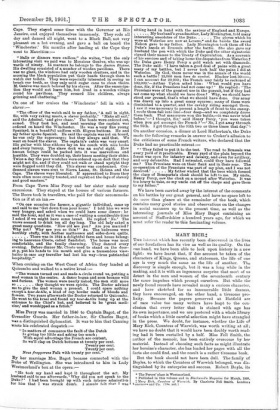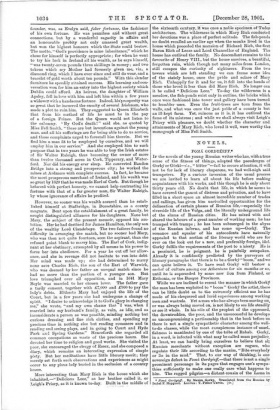MARY RICH.:
THE interest which has recently been discovered in the lives of our forefathers has its vice as well as its quality. On the one hand, we have been able to look upon history in a new light : we have learnt that, if due account be taken of the characters of Kings, Queens, and statesmen, the life of one age is very much the same as the life of another. The discovery is simple enough, but it was a long while in the making, and it is with an ingenuous surprise that most of us detect in the men and women of the seventeenth century the same impulses which prompt ourselves. But while the newly found records have revealed many a curious character, and have sketched for us innumerable little dramas, they have encouraged, on the other hand, a tiresome pro- lixity. Because the papers preserved at Hatfield are of rare value too many writers have leapt to the con- clusion that every letter that is stained with age has its own importance. and we are pestered with a whole library of books which a little careful selection might have strangled in the press. We doubt, for instance, whether the Life of Mary Rich, Countess of Warwick, was worth writing at all ; we have no doubt that it would have been doubly worth read- ing had it been curtailed by a half. Miss Fell Smith, the author of the memoir, has been entirely overcome by her material. Instead of choosing such facts as might illustrate her heroine's character, she has loaded her pages with all the facts she could find, and the result is a rather tiresome book.
But the book should not have been dull. The family of Boyles, to which the Countess of Warwick belonged, was dis- tinguished by its enterprise and success. Robert Boyle, its
• The Percy's' place in Westmorland.
t Published in this volume and in Blackwood's Magazine for March, 1899. : Mary Bich, Countess of Warwick. By Charlotte Pell Smith. London, Lorenz:lane and Co. fiRs. net.1 founder, was, as Evelyn said, faber fortunae, the fashioner of his own fortune. He was penniless and without great connections, but by a wonderful sagacity in affairs and an honourable probity not only amassed great wealth, but won the highest honours which the State could bestow. The motto, " God's providence is mine inheritance," which he chose for himself is perfectly appropriate ; for when he went to try his luck in Ireland all his wealth, as he says himself, "was twenty-seven pounds three shillings in money; and two tokens which my Mother had formerly given me, viz., a diamond ring, which I have ever since and still do wear, and a bracelet of gold worth about ten pounds." With this slender furniture he speedily attained success. His learning and con- versation won for him an entry into the highest society which Dublin could afford. An heiress, the daughter of William Apsley, fell in love with him and left him within a few years a widower with a handsome fortune. Indeed, his'prosperity was so great that he incurred the enmity of several Irishmen, who made a plot to ruin him. They suggested to Queen Elizabeth that from his method of life he must be in the pay of a foreign Prince. But the Queen would not listen to the calumny. "By God's death ! " said she, as quoted by Miss Fell Smith, "these are but inventions against the young man, and all his sufferings are for being able to do us service, and those complaints urged to forestall him therein. But we find him a man fit to be employed by ourselves, and we will employ him in our service." And she employed him to such purpose that in two years he was able to buy the Irish estates of Sir Walter Raleigh, thus becoming the owner of more than twelve thousand acres in Cork, Tipperary, and Water- ford. Nor did his energy ever sleep. He converted Bandon Bridge into a strong and prosperous city; he worked the mines at Ardmore with complete success. In fact, he became the most prosperous merchant of Ireland, and his wealth was so great by 1620 that he was made Earl of Cork. But though he behaved with perfect honesty, we cannot help contrasting his fortune with that of a far greater man, Sir Walter Raleigh, by whose ignorance of affairs he profited.
However, no sooner was his wealth assured than he estab- lished himself at Stalbridge, in Dorsetshire, as a county magnate. Bent upon the establishment of a great family, he sought distinguished alliances for his daughters. None but Mary, the subject of the present memoir, opposed his am- bition. Her he had destined for James Hamilton, the only son of the wealthy Lord Clandeboye. The two fathers found no difficulty in arranging the match, but no sooner had Mary, who was then not quite fourteen, seen the aspirant, than she refused point blank to many him. The Earl of Cork, indig- nant at her obstinacy, attempted by all means in his power to force her into obedience. For a year he cut off her allow- ance, and she in revenge did not hesitate to run into debt. Her mind was made up; she had determined to marry none save Charles Rich, the son of the Earl of Warwick, who was deemed by her father an unequal match since he had no more than the portion of a younger son. But love triumphed over all opposition, and in 1641 Mary Boyle was married to her chosen lover. The father gave a tardy consent, together with 27,000 and 2100 to pay the lady's debts. Hitherto Mary had enjoyed the life of the Court, but in a few years she had undergone a change of spirit. "I desire to acknowledge it to God's glory in changing me," she wrote, "and my own shame that 'I was, when I married into my husband's family, as vain, as idle, and as inconsiderate a person as was possible, minding nothing but curious dressing and fine rich clothes, and spending my precious time in nothing else but reading romances and in reading and seeing plays, and in going to Court and Hyde Park and Spring Gardens." Henceforth she regarded all common occupations as waste of the precious hours. She devoted her time to religion and good works. She visited the poor, she encouraged the clergy of Essex, and she composed a diary, which remains an interesting expression of simple piety. But her meditations have little literary merit; they merely set forth such observations and experiences as might occur to any pious lady buried in the seclusion of a country house.
More interesting than Mary Rich is the house which she inhabited,—" Delicious Leez," as her brother called it, or Leigh's Priory, as it is known to-day. Built in the middle of the sixteenth century, it was once a noble specimen of Tudor architecture. 'The wilderness in which Mary Rich conducted her devotions was a place of perfect solitude. The fish-ponds no doubt recalled an earlier age when the monks lived In the house which preceded the mansion of Richard Rich, the first Baron Rich of Leeze and Lord Chancellor of England. The house has outlived the family. No descendant remains to the favourite of Henry VIII., but the house survives, a beautiful, forgotten ruin, which though not many miles from London, still escapes the curiosity of sightseers. From the two towers which are left standing we can frame some idea of the stately house, once the pride and solace of Mary Rich. Unhappily for it and for us, it fell into the hands of those who loved it less than did Mary Rich. No longer can it be called "Delicious Leez." To-day the wilderness is a meadow, the fish-ponds exist only in outline, the bricks which once were fashioned into tower and gallery have been turned to humbler uses. Even the feuit-trees are torn from the walls, and what was once the just pride of a county is but an ill-kept farm. Yet, ruinous as it is, it has outlived the fame of its mistress ; and while we shall always visit Leigh's Priory with pleasure, we doubt whether the character and attainments of Mary Rich, who loved it well, were worthy the monograph of Miss Fell Smith.



































 Previous page
Previous page